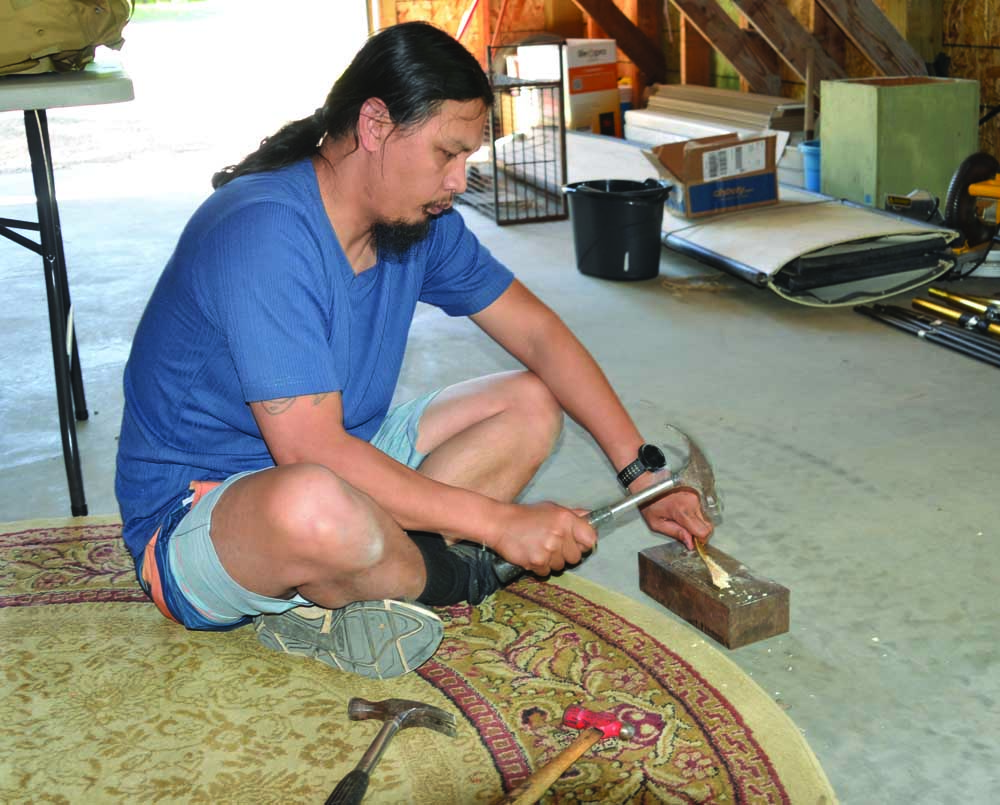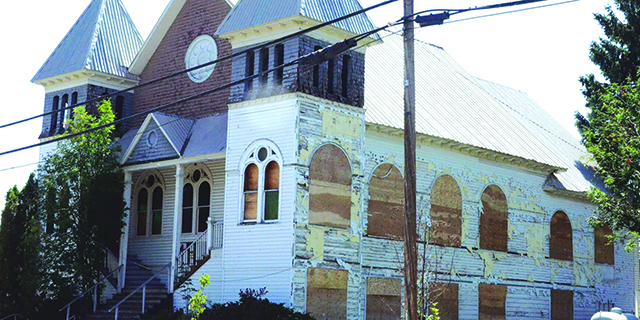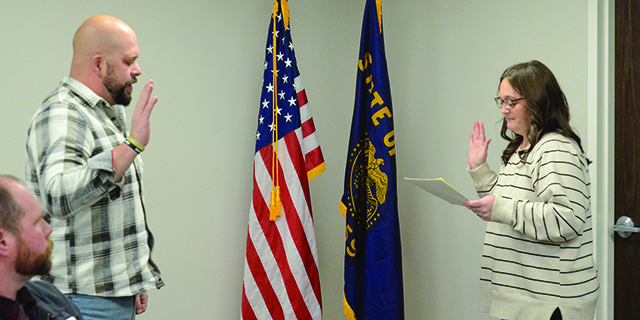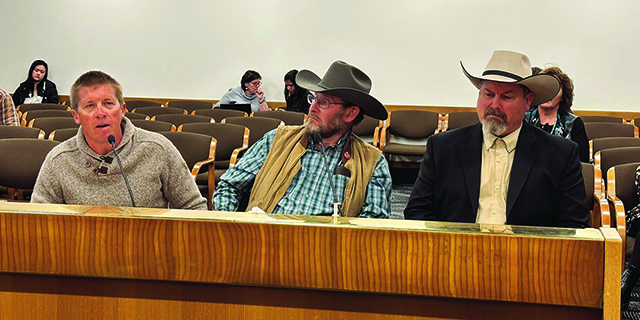Healing in the hills: Divide Camp helps vets
Published 7:00 am Wednesday, June 30, 2021

- Army veteran Jesse Palacios pounds elk sinew Thursday, June 24, 2021, for use in a longbow during a Divide Camp class on bow making. Palacios served two tours in Afghanistan and one in Iraq between 2004 and 2011.
WALLOWA COUNTY — Julie Wheeler is on a mission from God — a mission to help heal wounded warriors with Divide Camp.
Although it’s become well known for giving veterans the chance to bag big game, Divide Camp is much more. June 20-26, the camp held its second Health and Wellness Retreat with about nine post-9/11 veterans.
Trending
A vision
“The initial vision for this camp in 2011 was healing through nature,” Wheeler said. “The hunting division has been a separate program. I love the hunting program. I love sending the vets home with all that meat, but that isn’t what our mission is. We send people up into the high country, down the rivers, teach them how to fly fish, that’s where they heal.”
Wheeler, who owns the 40 acres east of Joseph, said she was inspired to tell the whole story of Divide Camp after she approached a naturalist in Joseph and asked her to come lead a nature walk at the camp.
“These guys really need to start observing nature and creation,” Wheeler said.
Although not a veteran, Wheeler said two things from her own experience prompted her to use the family property as a healing ministry for veterans.
“First, I was a critical incident stress debriefer for 20-some years for the federal government debriefing aviation accidents, wildfire involvement … so I have knowledge of what happens to people when they are traumatized. These guys, you can’t imagine some of the trauma they’ve been through. Knowing that gives you the things to help them,” she said. “The other part is I was a Bible smuggler in the ‘80s and while I was in China … I had a young man say to me, ‘Is it true, that in America, you get to pick your job?’ Those questions went on and on: ‘Is it true you don’t have to apply for a permit to travel from one city to another?’ All these things that we so take for granted. It’s because of these guys that we still have those rights, and that’s big in my heart. This was a mission God gave me. There’s no question. The vision happened sitting on that front porch. It was just so clear. I’ve been doing it; he’s been doing it through me.”
Trending
Wheeler’s parents, Jim and Rita Fossen, bought the land in the 1960s. Jim worked a long time as an outfitter and elk-hunting guide. After he died in 1991, the property and its buildings started deteriorating, so Wheeler considered selling it.
“Then, when I got here, even though it was all rat-infested and falling apart, I sat on that front porch and … I just felt the Lord speak to me that this is a perfect place for healing vets,” she said.
The facility
Divide Camp is on a secluded site reached only after a long drive up a rough, gravel road that turns off the highway to Halfway. Wheeler prefers to not precisely reveal the location so as to not attract prospective trespassers.
The site has a main cabin that includes a large front porch and a kitchen. Outside, there is an outdoor kitchen and eating area, several sleeping cabins and plenty of room for tents — for those who prefer them. There’s also a shop-type building that also doubles as a classroom.
There’s a 3,000-gallon water tank that serves the camp. Some of the cabins have septic tanks, but for the most part, outhouses are used. Given the remote location, it’s no surprise there’s virtually no cellphone service. However, with the aid of a booster, one site does provide cell service — it’s a fake “phone booth,” Wheeler said.
There also are numerous trails, a 3-D archery range, campfire areas and “nothing too distracting up here,” she said.
During the Health and Wellness Retreat, each day starts with devotions on the porch of the main cabin, followed by stretches to help with pain management. The vets also hear a talk from a naturalist; take nature walks; train on a fitness trail; play board games and outdoor games; take in nighttime nature observations; learn hunting, tracking, trapping and fishing; take part in fly-tying classes and writing workshops; or go backpacking into the wilderness with llamas or goats and a trip this year called “Finding God in the Wilderness.”
They also have classes in longbow-making and Native American arts, such as making a flute.
“A lot of healing happens up in the Eagle Caps,” Wheeler said.
Pain management
Army veteran Luke Norton is one who helps his fellow vets manage pain. After serving from 1998-2005, which included a one-year tour in Afghanistan, he realized he could help other vets. He went to school and received degrees in sports medicine with exercise science concentrations.
“We’re not talking about medication. We’re trying to manage pain by realigning the spine and getting it to where it needs to be. We use mostly just stretches,” Norton said.
He noted while the military is well known for insisting on correct posture, “they put a heavy ‘rock’ on your back,” and troops often are sitting a lot, hunched over and doing other things that are hard on the spine. So Norton’s working to remedy the damage caused.
“We’re anatomically realigning the disks,” he said.
Most of the veterans aren’t seriously handicapped, though the camp can accommodate ones with missing limbs. Most of the injuries are to backs and shoulders.
Norton has found that in just a short time, most vets say they’re feeling better.
“From what I’ve heard from these guys is that their pain, even after the first day” is easing, he said.
Norton said his contribution is not unlike the support he gave — and received — while overseas.
“There were groups of guys like this who were my support system and I was their support system and we just got through it together,” he said. “You get over there and, ‘I’m fighting for my country,’ and all this, but that’s not the case. But you’re fighting for survival and you’re fighting for your buddies to survive. I’m happy to be here to help these guys out. You know, the military beats us up and then we’re supposed to get out of the military and maintain our physical and mental health. That’s part of this too: if I can get their physical health under control, it really helps mentally, too.”
Who the camp helps
Wheeler said the veterans Divide Camp is there for are those who served post-9/11. She said some local folks have accused Divide Camp of being prejudiced and discriminatory against pre-9/11 vets.
“Like I told them, there’s nothing we do here that you couldn’t do if you wanted to help a Vietnam vet,” she said.
The older vets, Wheeler said, “have pretty much established their coping mechanisms. We’re working with a lot of people for whom their PTSD (post-traumatic stress disorder) is really fresh and they’re looking for ways to mitigate the symptoms of war. And they’re young enough, that if they find things — especially the outdoors — it’s proven, we see it happen, their lives change. The older vets — the Vietnam vets — many of them have been out (of the service) 50 years. Sure, they want to go hunting, they want to go fishing and all the things these guys do, but we’re not going to change them.”
However, she said, the older veterans still can reap a reward by volunteering at the camp.
“Serving other vets, that changes them,” she said.
Peer counseling
Veterans helping each other is a key component of healing, Wheeler said, with the reestablishment of the camaraderie they experienced in the military. As a result, the camp isn’t open to the families of vets.
“We focus on them and their struggles, partly because when they get together like this, they do amazing peer counseling and they don’t even know it,” she said. “But whether they’re sitting around or having lunch or whatever, you hear these conversations and things like, ‘Ah, I didn’t know you were there. I was there this year,’ and pretty soon they’re talking about their experiences; things they can’t share with a spouse. Out of my experience with debriefing — which is all peer-driven — it’s more powerful and valuable to share things with people who ‘get it’ and who’ve experienced it. That’s why Vietnam vets are such amazing volunteers. I’ve had so many Vietnam vets tell me that helping these guys is the best thing that ever happened to them. The older ones serving the younger ones is powerful.”
The vets
Army veteran Bryan Kove, who was in Iraq in 2008-09, was on his second Health and Wellness Retreat last week.
“It gives a space for clarity,” he said. “Back home in the city, it’s really hard to work through the things that are working on my heart and mind left over from being overseas and coming back and there’s so many difficulties to face in that transition from soldier to citizen. It’s a work in progress. The Army tells you how to be a soldier, but they never tell you how to go back.”
Kove said he believes America should do more to help veterans transition back to civilian life.
“I think there should be something, but I don’t think the Army is the one that’s going to be able to do it right,” he said. “There are so many cultures out there that treat their warriors better and with more care than the U.S. does.”
Clifford Cole, who was a combat medic in the Army during the initial invasion of Iraq in 2003-04, definitely finds meeting fellow vets in a remote location to be healing.
“I could talk for an hour,” he said. “By meeting people, it’s helped me feel better and to get away from the stress of the city and being with the other dudes. The camaraderie, everybody’s hanging out, everybody’s getting along, it’s great.”
There’s even some good-natured rivalry between veterans of different branches. When a Marine Corps veteran told the branch of service in which he served, there erupted a chorus of “ooo-rahs.” The same went with Army veterans and their “hoo-ahs.”
The camp also attracts veterans’ families as volunteers, although “not nearly enough,” Wheeler said.
Volunteer Ramona Phillips observed, “Volunteerism is waning. … This sort of touched my heart.” Her whose son, Shawn, served two tours in Iraq before one in Afghanistan.
“When my son, Shawn, came back from Iraq, he was Shawn,” she said. “When he came back from Afghanistan, he was not. I think the biggest thing he did that I’m the proudest of was admitting he had the PTSD. I have seen so many healings with people up here. I see him with a big smile; he just loves it up here. That’s the one thing you can’t say enough about is the healing that takes place up here. … It’s his story, but he came back and it took him awhile to admit there was a problem and to seek help. He got counseling … the whole family had counseling, but this was huge for him.”
Wheeler agreed.
“When you listen to those guys laughing — for some of them, they haven’t really laughed since they left for war, and now they’re just happy,” she said.
Headquarters: 603 N. Main St./P.O. Box 49, Joseph, Oregon 97846
Phone: 541-531-9939
Email: dividecamp@charter.net
Cost: Nothing to a vet









